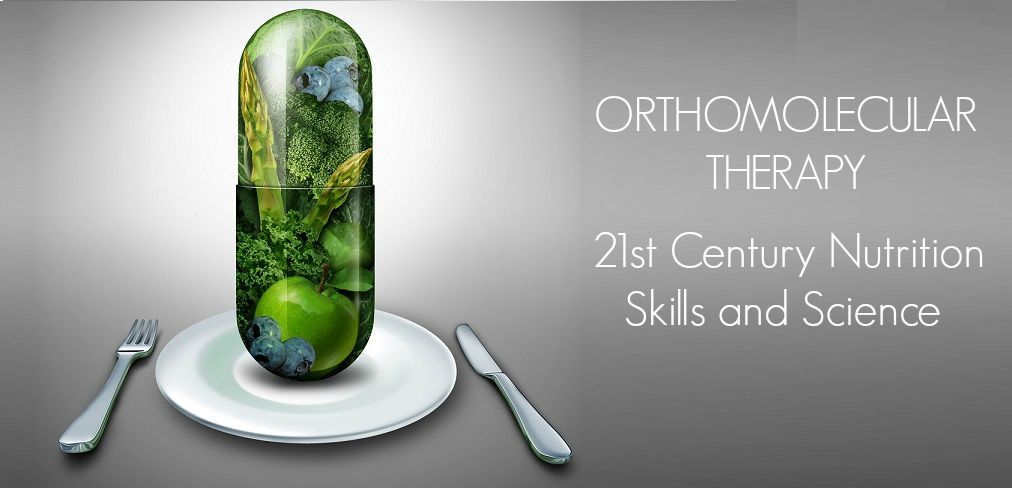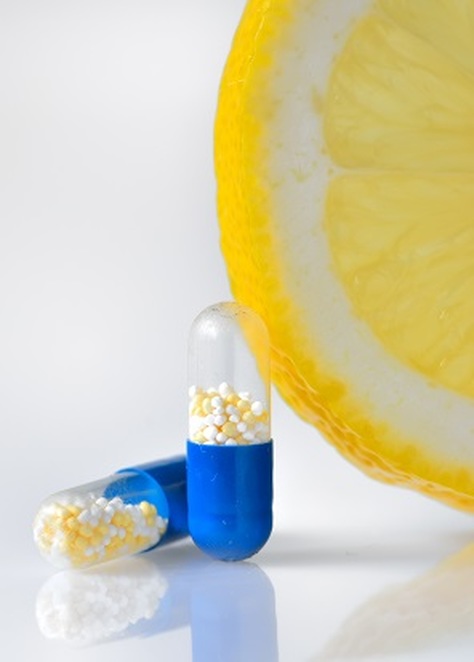definitiON
WHAT IS ORTHOMOLECULAR THERAPY?
|
ORTHOMOLECULAR NUTRITION is the science of using MICRO and MACRONUTRIENTS such as VITAMINS, MINERALS, HERBS, AMINO ACIDS, etc. from natural foods and supplements.
The purpose is :
ORTHOMOLECULAR THERAPY can be used like COMPLEMENTARY APPROACH in many diseases protocols. This is also a preventive measure to impede the progress of degenerative processes. LINUS PAULING in 1968 broadened this concept into ORTHOMOLECULAR MEDICINE, meaning "right molecules in the right concentration characterized an approach to the prevention and treatment of disease and attainment of optimum health that was based on the physiological and enzymatic actions of specific nutrients, such as vitamins, minerals, and amino acids present in the body. http://lpi.oregonstate.edu/linus-pauling-biography |
originS
|
THE ORIGINS OF ORTHOMOLECULAR THERAPY
The principles behind orthomolecular medicine originated in the 1920’s, WHEN VITAMINS AND MINERALS WERE FIRST USED TO TREAT ILLNESSES. LINUS PAULING, double-Nobel laureate, starts speaking about the importance of vitamins since 1930. Scientific evidence began to surface over many years, then in the 1950’s, Abram Hoffer, M.D. and Humphrey Osmond, M.D.,BEGAN TREATING SCHIZOPHRENICS WITH HIGH DOSES OF VITAMIN B3 (NIACIN). |
Their studies revealed that niacin, in combination with other treatments, could double the number of remissions in a single year.
http://ashcenter.com/treatments/orthomolecular-therapy/
http://ashcenter.com/treatments/orthomolecular-therapy/
metHODS
METHODS USED IN ORTHOMOLECURAR THERAPY:
|
Today, many diseases such as atherosclerosis, cancer, diabetes, depression or other disorders are associated with specific biochemical abnormalities which are causal or contributing factors of the illness.
There are many methods in the entire world employed by orthomolecular physicians like:
|
malnutrition
MALNUTRITION caused by CONSUMPTION OF REFINED AND PROCESSED FOODS COULD INITIATE DISEASE .
The diet is fundamental in determining the future health and wellness of an individual.
The diet is fundamental in determining the future health and wellness of an individual.
|
DON'T FORGET:
|
By using orthomolecular nutrition, the body is strengthened and overall health is improved.
Orthomolecular Medicine has powerfull science-based foundations of nutrition and biochemistry that have grown at a prodigious rate in the last decades.
Please visit our page regarding the NUTRITIVE VALUE OF OUR FOOD to understand better why supplementation is ``a must`` in our lifetime.
Orthomolecular Medicine has powerfull science-based foundations of nutrition and biochemistry that have grown at a prodigious rate in the last decades.
Please visit our page regarding the NUTRITIVE VALUE OF OUR FOOD to understand better why supplementation is ``a must`` in our lifetime.
THE BASICS
WHAT ORTHOMOLECULAR THERAPY CAN DO FOR YOU :
Peoples had to know that :
|
dr. Richard A. Kunin, M.D.
Richard A. Kunin, M.D. the founder President of Society for Orthomolecular Health Medicine says:
First of all, the orthomolecular data base rests strongly on the following areas of scientific knowledge:
First of all, the orthomolecular data base rests strongly on the following areas of scientific knowledge:
|
1. nutrition
2. biochemistry 3. cell biology 4. physiology 5. general medicine, immunology 7. allergy 8. endocrinology 9. pharmacology 10. toxicology 11. gastroenterology |
12. parasitology
13. nephrology 14. physical medicine and manipulation therapies 15. dentistry 16. veterinary science 17. food science 18. agriculture 19. climatology 20. medical politics. |
The following therapeutic modalities fit the definition of orthomolecular:
|
1. vitamins
2. minerals 3. amino acids 4. essential fatty acids 5. fiber 6. enzymes 7. antibodies 8. antigens 9. cell therapy 10. chelation therapy 11. dialysis 12. Plasmapheresis |
13. hydrotherapy
14. thermal therapy 15. phototherapy 16.electrotherapy (including electroconvulsive therapy) 17. air ion therapy 18. light therapy 19. solar therapy 20. acupuncture 21. massage 22. exercise 23. biofeedback 24. hypnotherapy and other psychotherapies. |
All of the orthomolecular practice rests on a foundation of basic science advances in biochemistry, biophysics, physiology, psychophysiology and ecology.
We do not eschew drug therapy or pharmacology; but we do recognize their limitations and their potential for toxicity.
Orthomolecular knowledge gives greater choice of benefits for our patients id with less risk of adverse effects.
http://www.orthomed.org/home/kunin.html
15 principLES
THE ORTHOMOLECULAR PRACTICE : ''PUT NUTRITION FIRST''!
Here is a list of 15 principles that identify the spirit" of Orthormolecular Medicine:
1. Orthomolecules come first in medical diagnosis and treatment. Knowledge of the safe and effective use of nutrients, enzymes, hormones, antigens, antibodies and other naturally occurring molecules is essential to assure a reasonable standard of care in medical practice.
2. Orthomolecules have a low risk of toxicity. Pharmacological drugs always carry a higher risk and are therefore second choice if there is an orthomolecular alternative treatment.
3. Laboratory tests are not always accurate and blood tests do not necessarily reflect nutrient levels within specific organs or tissues, particularly not within the nervous system. Therapeutic trial and dose titration is often the most practical test.
4. Biochemical individuality is a central precept of Orthomolecular Medicine.
Hence, the search for optimal nutrient doses is a practical issue. Mega doses, larger than normal doses of nutrients, are often effective but this can only be determined by therapeutic trial. Dose titration is indicated in otherwise unresponsive cases.
5. The Recommended Daily Allowance (RDA) of the United States Food and Nutrition Board are intended for normal, healthy people. By definition, sick patients are not normal or healthy and not likely to be adequately served by the RDA.
6. Environmental pollution of air, water and food is common.
Diagnostic search for toxic pollutants is justified and a high "index of suspicion" is mandatory in every case.
7. Optimal health is a lifetime challenge.
Biochemical needs change and our Orthomolecular prescriptions need to change based upon follow-up, repeated testing and therapeutic trials to permit fine-tuning of each prescription and to provide a degree of health never before possible.
8. Nutrient related disorders are always treatable and deficiencies are usually curable.
To ignore their existence is tantamount to malpractice.
9. Don't let medical defeatism prevent a therapeutic trial.
Hereditary and so-called 'locatable disorders are often responsive to Orthomolecular treatment.
10. When a treatment is known to be safe and possibly effective, as is the case in much Orthomolecular therapy, a therapeutic trial is mandated.
11. Patient reports are usually reliable. The patient must listen to his body. The physician must listen to his patient.
12. To deny the patient information and access to Orthomolecular treatment is to deny the patient informed consent for any other treatment.
13. Inform the patient about his condition; provide access to all technical information and reports; respect the right of freedom of choice in medicine.
14. Inspire the patient to realize that Health is not merely the absence of disease but the positive attainment of optimal function and well-being.
15. Hope is therapeutic and orthomolecular therapies always are valuable as a source of Hope. This is ethical as long as there is no misrepresentation or deception.
The following tabulation further clarifies the role of Orthomolecular Medicine in relation to medical orthodoxy.
http://www.orthomed.org/home/kunin.html
1. Orthomolecules come first in medical diagnosis and treatment. Knowledge of the safe and effective use of nutrients, enzymes, hormones, antigens, antibodies and other naturally occurring molecules is essential to assure a reasonable standard of care in medical practice.
2. Orthomolecules have a low risk of toxicity. Pharmacological drugs always carry a higher risk and are therefore second choice if there is an orthomolecular alternative treatment.
3. Laboratory tests are not always accurate and blood tests do not necessarily reflect nutrient levels within specific organs or tissues, particularly not within the nervous system. Therapeutic trial and dose titration is often the most practical test.
4. Biochemical individuality is a central precept of Orthomolecular Medicine.
Hence, the search for optimal nutrient doses is a practical issue. Mega doses, larger than normal doses of nutrients, are often effective but this can only be determined by therapeutic trial. Dose titration is indicated in otherwise unresponsive cases.
5. The Recommended Daily Allowance (RDA) of the United States Food and Nutrition Board are intended for normal, healthy people. By definition, sick patients are not normal or healthy and not likely to be adequately served by the RDA.
6. Environmental pollution of air, water and food is common.
Diagnostic search for toxic pollutants is justified and a high "index of suspicion" is mandatory in every case.
7. Optimal health is a lifetime challenge.
Biochemical needs change and our Orthomolecular prescriptions need to change based upon follow-up, repeated testing and therapeutic trials to permit fine-tuning of each prescription and to provide a degree of health never before possible.
8. Nutrient related disorders are always treatable and deficiencies are usually curable.
To ignore their existence is tantamount to malpractice.
9. Don't let medical defeatism prevent a therapeutic trial.
Hereditary and so-called 'locatable disorders are often responsive to Orthomolecular treatment.
10. When a treatment is known to be safe and possibly effective, as is the case in much Orthomolecular therapy, a therapeutic trial is mandated.
11. Patient reports are usually reliable. The patient must listen to his body. The physician must listen to his patient.
12. To deny the patient information and access to Orthomolecular treatment is to deny the patient informed consent for any other treatment.
13. Inform the patient about his condition; provide access to all technical information and reports; respect the right of freedom of choice in medicine.
14. Inspire the patient to realize that Health is not merely the absence of disease but the positive attainment of optimal function and well-being.
15. Hope is therapeutic and orthomolecular therapies always are valuable as a source of Hope. This is ethical as long as there is no misrepresentation or deception.
The following tabulation further clarifies the role of Orthomolecular Medicine in relation to medical orthodoxy.
http://www.orthomed.org/home/kunin.html






